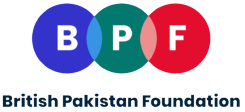BPF Women
Buses in London celebrating 70 years of Pakistan’s independence
During the summer of 2016, I volunteered to teach English as a second language at one of the ESOL schools in the UK, funded primarily by a non-profit organisation focusing on women’s education. I encountered a considerable class size with an array of ages, ethnicities, nationalities and varying levels of speaking and reading ability. It became clear to me whilst teaching that some of the women in the class had a very limited or no understanding at all of the tasks being set. I altered my teaching method to set an activity for the whole class to undertake, and then to focus on the particular individuals who were struggling. I was able to communicate with a few students in Urdu and Hindi, and give them direct translations, which was a significant advantage, as I was able to explain terms and concepts to my students colloquially, in their mother tongue. This feature is not ubiquitous in ESOL teaching methods, but is clearly invaluable to a vast amount of students.
As the day progressed, the class size decreased as the women left to perform the tasks expected of them as mothers and wives, thus reducing valuable teaching time; indispensable to a functioning understanding of the language. Thus, a social and cultural barrier was introduced to the women’s endeavours.
The ability to speak English is not only absolutely necessary in order to attain employment and communicate with other members of a community, but also to promote individual independence. Rabiya, one of my young Pakistani students, told me that she was looking forward to going to the shops without her husband’s consent, and soon, she hoped, without his money. In this way, the English language not only allows women to enter the workforce, but also to become integrated and immersed within the community. It is essential to educate women specifically, as they are consequently able to aid their families and communities, in turn. In this way, the benefits of educating a single woman are undoubtedly widespread, specifically within the British Pakistani community. When we strive to educate British Pakistani women, we strive towards social and gender equality, and greater opportunity and representation for Pakistani women, as we give them voices, and allow them to be heard.
British Pakistan Foundation Denounces Racially Insensitive Language
The British Pakistan Foundation (BPF) condemns in the strongest
14 British Pakistanis in the King’s Birthday Honours List
The King’s Birthday Honours List this year highlights the




